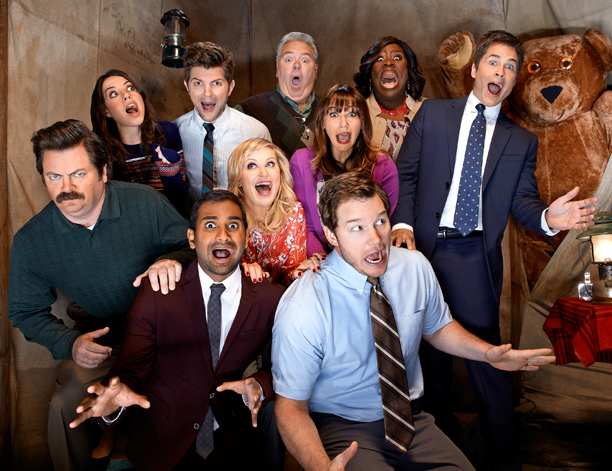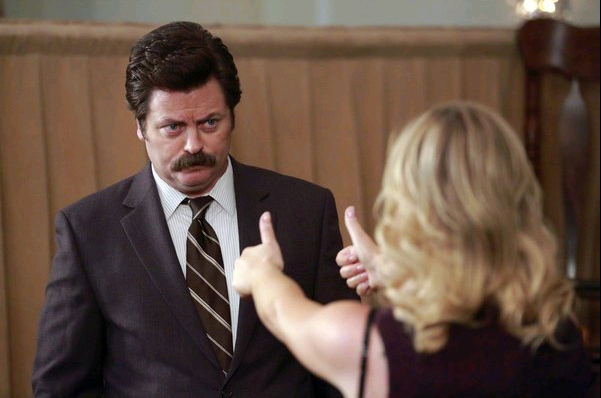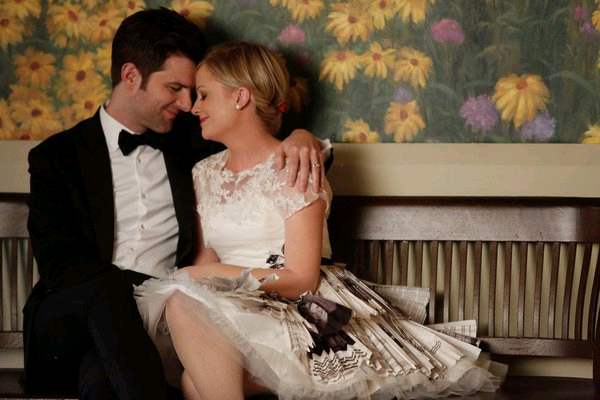 The time has come to light 5,000 candles in the wind. After seven seasons, “Parks and Recreation,” America’s highest-rated Indiana-based sitcom (hey, its ratings were never very good), is drawing to a close. But while some beloved TV shows seem badly dated soon after their cancellation — here’s looking at your homophobia, “Friends” — this mockumentary series about a small branch of local government will be appreciated for years to come. I could present a million reasons for its timelessness in a color-coded binder but to appease the Ron Swansons among us, I’ll limit the list to five–sort of.
The time has come to light 5,000 candles in the wind. After seven seasons, “Parks and Recreation,” America’s highest-rated Indiana-based sitcom (hey, its ratings were never very good), is drawing to a close. But while some beloved TV shows seem badly dated soon after their cancellation — here’s looking at your homophobia, “Friends” — this mockumentary series about a small branch of local government will be appreciated for years to come. I could present a million reasons for its timelessness in a color-coded binder but to appease the Ron Swansons among us, I’ll limit the list to five–sort of.
1. The “Fine Wine” factor. The first season of “Parks” was so wobbly that it’s a wonder it was renewed. Leslie Knope (Amy Poehler) was essentially a female Michael Scott; Ron Swanson (Nick Offerman) was a preening bully; even Tom Haverford (Aziz Ansari) was a glib know-it-all without his 1,000-thread-count underbelly. But the show soon got its bearings — phasing out Leslie’s iron maiden mom (Pamela Reed) and mopey Mark Brendanawicz (Paul Schneider); fleshing out Andy (Chris Pratt), Jerry (Jim O’Heir), and Donna (Retta); and bringing in the Frick and Frack duo of Chris Traeger (Rob Lowe) and Ben Wyatt (Adam Scott). Best of all, Knope transformed from a dumb, strident bureaucrat to a brilliant up-and-comer whose heart lacked an off switch. After that, the show got better every year, achieving an unprecedented level of character development for an American sitcom and making the careers of a handful of unknowns. (Case in point: Chris Pratt is the new Marvel darling.) This year the series even fast-forwarded to the “slight future” of 2017 to incorporate such sly-eyed elements as transparent electronics, Shia LaBeouf as a dress designer, and the rando celeb pairing of Jesse Eisenberg and Nicki Minaj.
2. God is in the details. With comedic world-building to rival “The Simpsons,” Parks and Recreations left no subplot or subsidiary character unturned. Jerry’s name changed at least three times during the series. Local talk-show host Joan Callamezzo penned the memoir “Game of Joans.” Shock-jock The Douche (Poehler’s real-life beau Nick Kroll) revealed a degree in semiotics from Northwestern University. Librarians (not just Tammy II) were consistently rejected as “devil’s spawn.” Duke Silver was outed in Season 6. Tom and Donna’s “Treat Yo Self” outings got so decadent that they feasted on sushi made from celebrities’ fish. Catch phrases like “Snitches Get Stiches” echoed forever. Local obstetrician/evil magnate Dr. Saperstein (Henry Winkler) was introduced as the father of baller twins Jean-Ralphio and Mona-Lisa Saperstein (Ben Schwartz and Jenny Slate). And, of course, cameos never failed to delight us, including Paul Rudd as a silverspoon City Council candidate, Justin Thoreaux as Leslie’s “emotional tourist” beau, Parker Posey as Leslie’s ex best friend, Christie Brinkley as Jerry’s inexplicably gorgeous wife, Werner Herzog as the owner of a creepy house, Questlove as Donna’s long-lost brother Levandrius, Bill Murray as Mayor Gunderson, and Joe Biden and Michelle Obama as themselves.
And, of course, cameos never failed to delight us, including Paul Rudd as a silverspoon City Council candidate, Justin Thoreaux as Leslie’s “emotional tourist” beau, Parker Posey as Leslie’s ex best friend, Christie Brinkley as Jerry’s inexplicably gorgeous wife, Werner Herzog as the owner of a creepy house, Questlove as Donna’s long-lost brother Levandrius, Bill Murray as Mayor Gunderson, and Joe Biden and Michelle Obama as themselves.
3. Think globally, act locally. There’s never been a TV show more proudly Midwestern, especially in an era in which TV mostly focuses on The Coasts, voter turnout is at an all-time low, and the country is brutally split into red and blue. The words Republican and Democrat were never uttered once — though libertarian was deployed wily-nily, thanks to anti-government government worker Ron — and local politics reigned supreme. Among the unsexy civic issues tackled: childhood and adult obesity, the dwindling funding of arts education, diabetes, voting corruption, corporate environmental terrorism, and the plight of the American small business. And with feminist activist Amy Poehler at the helm, we could rest assured that sexism rather than women were the butt of the joke.
4. Mean girls not welcome. Perhaps “Parks and Recreation” was most unique in its brand of humor; after that unfortunate first season, it was the least mean-spirited show ever to make us laugh out loud. (Even “30 Rock” favored bullies over the bullied.) Physical comedy (they should change the spelling of “prat falls” in Chris Pratt’s honor), montages (“Snake Juice,” anyone?), and meta-jokes were always in order. (Consier Pert Hapley’s memoir: The Thing About Me Is, I’m Perd Hapley.) But the show’s best trait was a “more the merrier” ethos in which everyone’s idiosyncrasies were lovingly embellished rather than mocked: Ron didn’t just embrace carnivorism ; he rejected salads as “the food of his food.” Leslie wasn’t just a workaholic; she planned to work seven days a week until she was 100, at which point she’d work six days a week and go to law school in “her time off.” The series even mocked mean humor by lampooning everyone’s immunity to the myriad talents and kindnesses of the bumbling Jerry/Gary/Larry/Terry.
5. All you need is love. Sorry, Claire Danes, but the term “cry-smile” should have been invented for this series. Whether it was Andy and April’s wedding, Leslie and Ben’s wedding, Ron and Diane’s wedding, Donna and Joe’s wedding (OK, we sense a theme here), Little Sebastian’s memorial, or the Unity Concert, laughter through tears were the order of the day.
 As the (bleeding) heart of “Parks and Recreation,” Leslie Knope set a mighty precedent, planning scavenger hunts, making scrapbooks and even inventing holidays for all her pals. (All hail “Galentines Day.”) This season in particular has been a mush-fest, as all the sweetest alliances — from Tom and Donna to Ben and Tom to Tom and Leslie to Leslie and Ron to Ron and April– are getting their due before the show’s conclusion. I can only imagine how many boxes of Kleenex we’ll go through during the finale. If experience has taught us anything, though, it’s that this is one show bound to deliver a happy ending.
As the (bleeding) heart of “Parks and Recreation,” Leslie Knope set a mighty precedent, planning scavenger hunts, making scrapbooks and even inventing holidays for all her pals. (All hail “Galentines Day.”) This season in particular has been a mush-fest, as all the sweetest alliances — from Tom and Donna to Ben and Tom to Tom and Leslie to Leslie and Ron to Ron and April– are getting their due before the show’s conclusion. I can only imagine how many boxes of Kleenex we’ll go through during the finale. If experience has taught us anything, though, it’s that this is one show bound to deliver a happy ending.
This was originally published in Word and Film.
